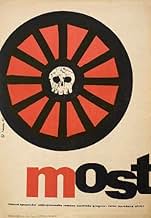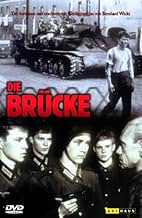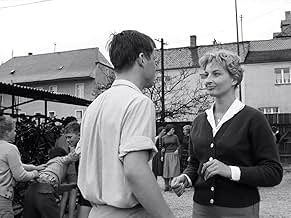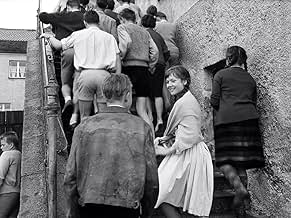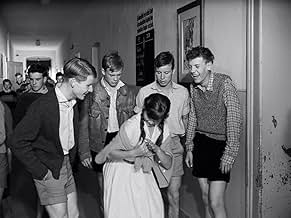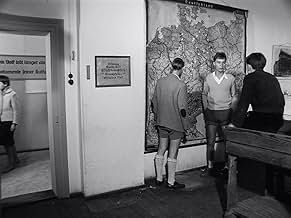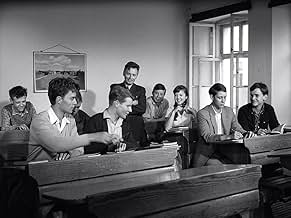CALIFICACIÓN DE IMDb
7.9/10
8.9 k
TU CALIFICACIÓN
Agrega una trama en tu idiomaIn 1945, Germany is being overrun, and nobody is left to fight but teenagers.In 1945, Germany is being overrun, and nobody is left to fight but teenagers.In 1945, Germany is being overrun, and nobody is left to fight but teenagers.
- Nominado a 1 premio Óscar
- 16 premios ganados y 1 nominación en total
Volker Bohnet
- Hans Scholten
- (as Folker Bohnet)
Günter Hoffmann
- Sigi Bernhard
- (as Günther Hoffmann)
Argumento
¿Sabías que…?
- TriviaThe end credits suggest that the story relates to true events which supposedly happened on "April 27, 1945", but this specific story is fictitious, while the general use of teenage boys as soldiers in the last days of the Third Reich is accurate.
- ErroresWhen the boys are assembled at night, they are told they will be part of the 336th Division. That unit was destroyed and surrendered to the Soviets on the Eastern Front nearly a year earlier in 1944 and was never reformed.
- Citas
Sigi Bernhard: Whoever defends one square foot of German soil defends Germany!
- Versiones alternativasAn English dubbed version was released in the USA in 1963.
- ConexionesEdited into Bernhard Victor Christoph Carl von Bülow genannt Loriot (2008)
Opinión destacada
This German contender for the Best Foreign Language Film Oscar is an unflinching war effort that obviously draws comparisons – in its narrative depicting the disillusionment experienced by a number of schoolboys-turned-soldiers – with ALL QUIET ON THE WESTERN FRONT (1930), albeit dealing with the subsequent world conflict. Though only rated * by the "Leslie Halliwell Film Guide", it boasts a favourable write-up therein – on the other hand, I was under the impression that it was given more than *** in the Leonard Maltin equivalent! For the record, it has received its due in "War Movies" – an oversized but appealing book on the subject owned by my father – and is even listed in the all-time top 3,000 movies ranked by the "Wonders In The Dark" website.
The acclaim this garnered upon release won Wicki the co-director gig on Darryl F. Zanuck's super production revolving around the D-Day landings THE LONGEST DAY (1962); his brief Hollywood tenure also comprised THE VISIT (1964) and, another WWII adventure, MORITURI (1965) – a distinguished actor in his own right, he is perhaps best-known for his supporting turn in Michelangelo Antonioni's LA NOTTE (1961). With respect to the film's cast, only the face of a youthful Fritz Wepper – future co-star of CABARET (1972) and the "Derrick" TV series – was familiar to this viewer. Oddly boasting no credits on the print I watched (except for the title and company credits!), this competed at the Oscars against Italy's THE GREAT WAR – a viewing of which followed in quick succession – that concerned itself, albeit on a vaster scale and in a serio-comic tone, with WWI but they were surprisingly defeated by the exotic French entry i.e. BLACK ORPHEUS.
The movie is basically divided into three parts: the first 40 minutes showing the boys in school; the next 30 illustrating their basic training and posting; and the last half-hour being devoted to the combat sequences. Most of the teenage boys are coming-of-age and experience their first sexual hang-ups before being sent to the front: a blond boy with the only female student in the class; another the salesgirl in his father's shop (who is also the boss' lover); and the cowardly Mayor's son towards the gymnasium instructor in a nearby girls' school. The battle scenes are certainly effectively rendered and appropriately harrowing, if occasionally over-the-top: a G.I., astonished to be confronted by a bunch of 16 year-olds, tells them to run off to their mothers but they find his condescending attitude insulting and he is literally gutted by their response!; an equally disdainful local, then, has his face blown off and body scarred by a backfiring bazooka, etc. The supreme irony of the film is that, while the boys' superior officer (who is himself shot almost instantly for apparent desertion by his own compatriots!) orders them to defend the expendable bridge ostensibly to keep the kids out of harm's way, the fact that the German forces intend blowing it up regardless so as to stem the Allied advance ensures that all but one of the fresh-faced soldiers sacrifice their lives to the fatherland unnecessarily!
The acclaim this garnered upon release won Wicki the co-director gig on Darryl F. Zanuck's super production revolving around the D-Day landings THE LONGEST DAY (1962); his brief Hollywood tenure also comprised THE VISIT (1964) and, another WWII adventure, MORITURI (1965) – a distinguished actor in his own right, he is perhaps best-known for his supporting turn in Michelangelo Antonioni's LA NOTTE (1961). With respect to the film's cast, only the face of a youthful Fritz Wepper – future co-star of CABARET (1972) and the "Derrick" TV series – was familiar to this viewer. Oddly boasting no credits on the print I watched (except for the title and company credits!), this competed at the Oscars against Italy's THE GREAT WAR – a viewing of which followed in quick succession – that concerned itself, albeit on a vaster scale and in a serio-comic tone, with WWI but they were surprisingly defeated by the exotic French entry i.e. BLACK ORPHEUS.
The movie is basically divided into three parts: the first 40 minutes showing the boys in school; the next 30 illustrating their basic training and posting; and the last half-hour being devoted to the combat sequences. Most of the teenage boys are coming-of-age and experience their first sexual hang-ups before being sent to the front: a blond boy with the only female student in the class; another the salesgirl in his father's shop (who is also the boss' lover); and the cowardly Mayor's son towards the gymnasium instructor in a nearby girls' school. The battle scenes are certainly effectively rendered and appropriately harrowing, if occasionally over-the-top: a G.I., astonished to be confronted by a bunch of 16 year-olds, tells them to run off to their mothers but they find his condescending attitude insulting and he is literally gutted by their response!; an equally disdainful local, then, has his face blown off and body scarred by a backfiring bazooka, etc. The supreme irony of the film is that, while the boys' superior officer (who is himself shot almost instantly for apparent desertion by his own compatriots!) orders them to defend the expendable bridge ostensibly to keep the kids out of harm's way, the fact that the German forces intend blowing it up regardless so as to stem the Allied advance ensures that all but one of the fresh-faced soldiers sacrifice their lives to the fatherland unnecessarily!
- Bunuel1976
- 24 feb 2014
- Enlace permanente
Selecciones populares
Inicia sesión para calificar y agrega a la lista de videos para obtener recomendaciones personalizadas
Detalles
- Tiempo de ejecución1 hora 43 minutos
- Color
- Mezcla de sonido
Contribuir a esta página
Sugiere una edición o agrega el contenido que falta


